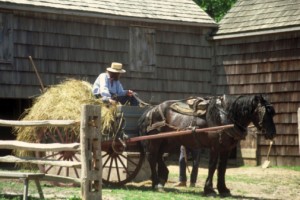The Economic Reasoning of "Ultimogeniture" of Amish Farms

Photos.com
My younger son’s family visited the nearby Amish country and did a tour of several farms. The guide mentioned that the youngest son usually takes over the farm from his father. The older brothers typically learn trades. She thought this happens because the father isn’t ready to give up the farm when the older brothers reach adulthood.
My economic explanation is that this minimizes the frequency of paying estate taxes (no longer a very binding constraint, but it was until quite recently). Perhaps this “ultimogeniture” is an illustration of an unusual excess burden generated by estate taxes. Or perhaps there’s another explanation? (Related: check out Freakonomics Radio on “The Church of ‘Scionology.'”)

Comments